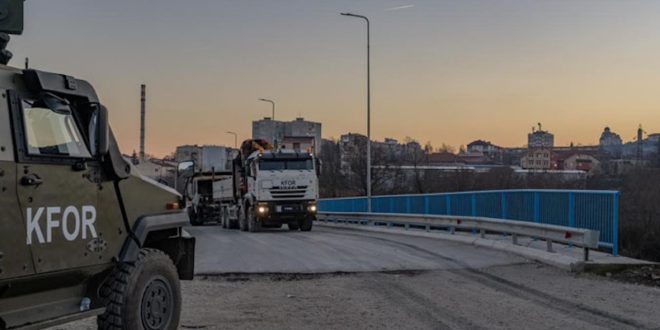Persistent ethnic tension in north Kosovo could trigger a repeat of violence seen in the area last year, when four people died in a gun battle and NATO peacekeepers were hurt in clashes, a senior official from the military alliance warned on Saturday (12 October).
Kosovo is predominantly ethnic Albanian but about 50,000 Serbs in the north reject Pristina’s government and see Belgrade as their capital. A former Serbian province, Kosovo declared independence in 2008 a decade after a guerrilla uprising.
US Navy Admiral Stuart B. Munsch, commander of the Allied Joint Force Command Naples – which oversees NATO’s peacekeeping in force in Kosovo – said the alliance remained concerned about the risk of repeated violence in the volatile north.
“Heated political rhetoric could inspire some non-government forces to commit violence such as what happened last year,” Munsch told reporters in Pristina.
“I would not say that definitely conflict is coming, I think there is a persistent risk,” he said, referring to a lack of progress in EU-mediated talks between Kosovo’s government and Serbia.
A police officer and three gunmen were killed in September 2023 when a group of heavily armed attackers entered from Serbia and attacked police in the village of Banjska.
Four months earlier, more than 90 soldiers were injured when Serb protesters attacked NATO peacekeepers.
Kosovo has accused Serbia of being behind the Banjska attack but Belgrade has denied the accusations.
The US and the European Union, Kosovo’s leading global allies, have criticised the Pristina government for taking unilateral actions in the north that could spark ethnic violence and risk the lives of some 4,000 NATO troops on duty there.
Kosovo rejects such criticism, and the issue has strained Pristina’s ties with its Western supporters.
As part of the EU-mediated dialogue, Kosovo and Serbia have been holding talks for more than a decade to normalise their relations, but there has been little progress.
Like the Serbs living in north Kosovo, Belgrade also considers Kosovo to be part of Serbia and refuses to recognise it as a state.
 Eurasia Press & News
Eurasia Press & News




